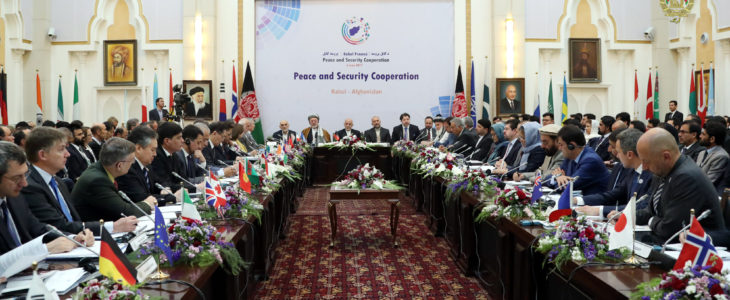Kabul Process Press Release
June 06, 2017
Afghanistan has launched the Kabul Process to find a path to building an inclusive peace. Speaking to representatives of 24 countries, President Ashraf Ghani said ‘Let there be no question at all. We most definitely want peace.’
The conference is being held in the wake of several violent attacks in Kabul. President Ghani said that in 2015 and 2016, 75,000 Afghan people were killed and injured, and he requested international support to ‘express solidarity against this terror and to begin the difficult process of defining a pathway that can lead to a just peace that ensures stability, security, and the rule of law.’
He called for new security alliances to face this common threat together. Afghanistan was making its contribution on the frontline of a new terrorist threat that threatens the security of the region and the world.
He said that 11,000 terrorists had come to Afghanistan in the last two years, as ‘Taliban sponsored terrorism is creating a platform that is bringing terrorists from all over the region to Afghanistan.’
He outlined the benefits to the region in assisting in Afghan stability, in terms of economic opportunity, and connectivity, turning Afghanistan’s geography to regional advantage.
Through the Kabul Process, the Afghan National Unity government hopes to secure international consensus to end transnational financing of terrorism. President Ghani said that in the early months of his administration, he had gone out on a limb to offer an olive branch to Pakistan, but it was ignored. He said ‘We want peace with Pakistan. We want to be able to trust Pakistan. And we want the chance for friendly, cooperative relationships that will reduce poverty and promote growth on both sides of the Durand Line .Our challenge is we cannot figure out what is it that Pakistan wants. What will it take to convince Pakistan that a stable Afghanistan helps them and helps our region?’
The president acknowledged the support of other governments and entities who have tried to negotiate with the Taliban. But progress had not been made, despite ‘bilateral, trilateral, quadrilateral, and even multilateral negotiations to bring an end to conflict and terror.’
Now the government wanted to create the conditions to talk directly to the Taliban, but it would not be an ‘open-ended opportunity.’ He demanded a lessening of violence and meaningful negotiations to end the conflict, citing the government’s success in making peace with the Hezb-i Islami – the first such peace deal in forty years of conflict.
The conference was also attended by three international entities, the EU, NATO and the UN. President Ghani said that the UN’s mission in Afghanistan, UNAMA should be strengthened to be a key counterpart in this process.’ And the UN would facilitate ‘a neutral, third party monitoring mechanism’ for the peace talks with the Taliban, ‘so that when a peace agreement is in sight, there is also the means to verify compliance and resolve disputes.’
The president praised the bravery of Dr Abdullah, Chief Executive Officer in the National Unity Government, who returned to a funeral that was disrupted by three suicide attackers who killed 18 people. He described another sort of bravery of a Kandahar mother, Bibi Shima, who sent her fourth son to join the security forces although three others had already died. She told the president that she had asked her son to fight the terrorists because she did not want other mothers and daughters in the village to feel the pain she had felt.
President Ghani finished his speech by saying that we all now live in one village, ‘a village that is under attack by networks that know no bounds or limits. Our purpose today is to show that we are as strong as Bibi Shima, as brave as His Excellency Abdullah, and as committed to ending the reign of the terrorist as are 31 million of my Afghan brothers and sisters.’

